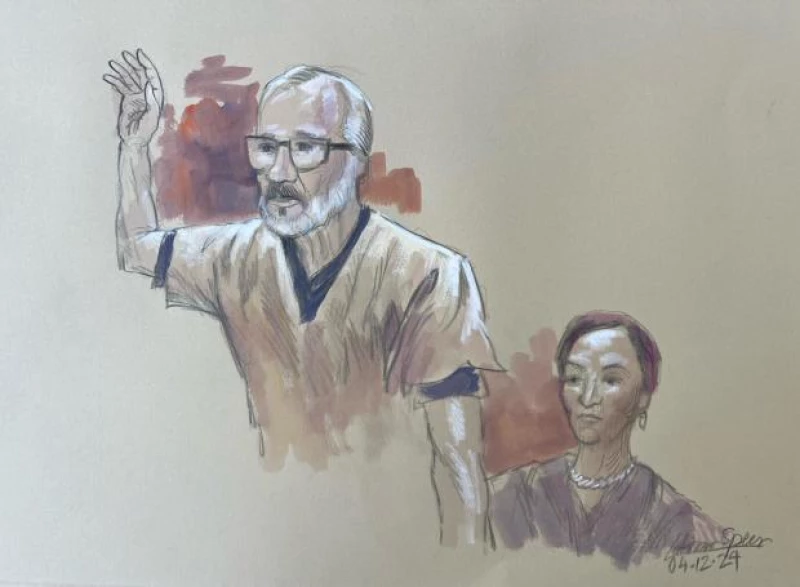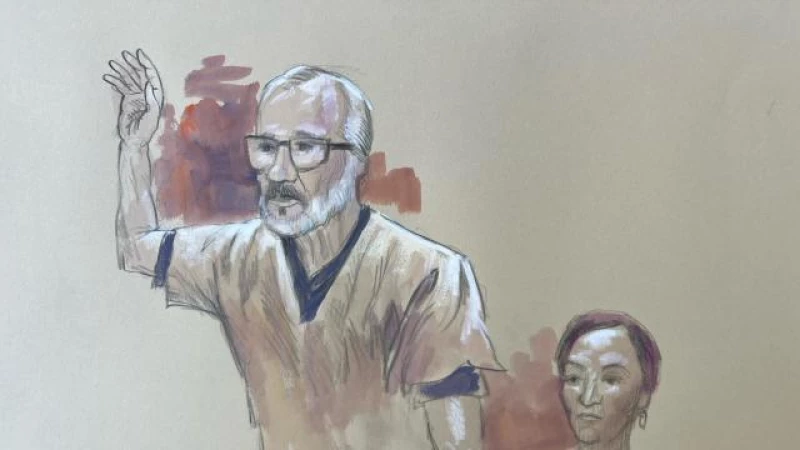Washington — Shocking news emerged on Friday as a former U.S. ambassador admitted to collaborating with Cuba's spy service for decades and received a 15-year prison sentence. This case, deemed one of the lengthiest betrayals of the U.S. government, came to a swift conclusion.
Victor Manuel Rocha, the ex-U.S. ambassador to Bolivia, was formally charged in December with espionage for Cuba's intelligence agency spanning over 40 years. Initially pleading not guilty in mid-February, Rocha later reversed his plea.
During a hearing on Friday, the case took a turn when U.S. District Judge Beth Bloom raised concerns about the plea deal's leniency, lacking restitution for potential victims and failing to revoke Rocha's U.S. citizenship. Prosecutors defended the 15-year sentence, pointing out that at 73 years old, Rocha is likely to spend the rest of his life behind bars.
Following discussions, the plea deal was revised to include restitution for potential victims, with details to be determined later. Additionally, denaturalization remains a possibility as a future civil action.
Rocha's Alleged Collaboration with Cuba
Details remain scarce regarding Rocha's activities to assist the communist regime or his potential impact on U.S. policies during his two-decade tenure at the State Department. Possessing high-level security clearances granting access to classified information, Rocha could have served as a valuable asset to Cuba, a nation historically at odds with the U.S.
Despite his access to sensitive information, Rocha faces charges of acting as a foreign agent rather than espionage. The Justice Department characterizes this as "espionage lite," carrying a less severe prison term.
Attorney General Merrick Garland has labeled the situation as "one of the highest-reaching and longest-lasting penetrations of the U.S. government by a foreign agent."
Originally from Colombia, Rocha relocated to New York at the age of 10 following his father's passing. His family resided with his uncle in Harlem, sustained by his mother's employment in a sewing factory and food assistance. In 1965, a scholarship enabled him to attend Taft School, a prestigious boarding school in Connecticut, altering the course of his life, as he recounted to the school's alumni magazine in 2004. However, during his time there, he encountered discrimination and contemplated suicide after his closest companion declined to room with him due to his skin color, he recounted.
Investigators assert that Rocha was recruited by Cuba's intelligence agency in Chile in 1973 subsequent to his graduation from Yale University. That same year, Chile's socialist president, Salvador Allende, was deposed in a coup supported by the U.S.
About Ambassador Rocha
- 1978: Became a naturalized U.S. citizen
- Degrees from Harvard and Georgetown universities
- 1981: Career at the State Department began
- Various positions in Latin America
- Clinton administration: Held influential role at the White House National Security Council
- 2000-2002: Ambassadorship in Bolivia
During his time as the ambassador to Bolivia, Rocha warned Bolivians about the potential consequences of electing leftist coca farmer Evo Morales as president, who was seen as a protege of Fidel Castro. This intervention actually helped boost Morales' standing, with Morales even acknowledging Rocha as his "best campaign chief," as reported by the New York Times in 2002.
Rocha also had involvement with Cuba during his time at the National Security Council and while serving at the U.S. mission in Havana in the 1990s. Post his tenure at the State Department, he served as an advisor to the commander of the U.S. Southern Command, which oversees Cuba.
According to CBS News, former U.S. Ambassador to Panama John Feeley mentioned that Rocha would have been incredibly valuable to the U.S. Southern Command.
The Unbelievable Revelation

Reports suggest that the FBI's suspicions of Rocha's involvement as a covert agent for Cuba stemmed from a tip received before November 2022. Surveillance conducted by the agency revealed Rocha meeting with an undercover FBI agent, whom he believed to be a representative of Cuba's spy agency.
On Nov. 15, 2022, the undercover agent initiated contact with Rocha through a WhatsApp message, claiming to be "from your friends in Havana." Subsequent phone conversations between the two led to an agreement to meet in person the following day.
Over the course of the next year, Rocha made alarming statements, referring to the U.S. as "the enemy" and boasting about their actions as "enormous" and "more than a grand slam," as per court documents.
"My number one concern; my number one priority was ... any action on the part of Washington that would — would endanger the life of — of the leadership, or the — or the revolution itself," Rocha allegedly told the undercover agent.
The complaint also alleged that Rocha met with his Cuban handlers as recently as 2017, first flying from Miami to the Dominican Republic using his American passport, then using a Dominican passport to fly to Panama and onto Havana.
Rocha said Cuba's spy agency had instructed him to "lead a normal life," and he eventually created a cover story "of a right-wing person" to conceal his double life, according to the complaint.
Feeley, who worked under Rocha when he was the deputy chief of mission for the U.S. Embassy in the Dominican Republic, said in recent years Rocha became an "over-the-top Donald Trump guy." The two had kept in touch since their posting in the Dominican Republic, but when Feeley last saw Rocha in 2019, the previously apolitical Rocha had "gone down a Trump-MAGA rabbit hole," as Feeley put it.
"It was really uncomfortable," Feeley said, adding that he and his former colleagues never suspected it was a cover. "I've already been through the whole cycle of grief here. The shock is complete."
Feeley resigned as U.S. ambassador to Panama in 2018 over policy disputes with the Trump administration.
Feeley recounted how Rocha excelled in his role and was generous in his guidance, but his strong ego often led him to believe he was more intelligent than others.
It was on June 23, 2023, when Rocha had his final rendezvous with an undercover FBI agent at an outdoor food court located behind a church in Miami. According to prosecutors, Rocha grew irate when the agent inquired, "Are you still with us?"
"I am infuriated," Rocha reportedly retorted, feeling as though his masculinity was being questioned. He added, "It's as if you want me to prove myself by taking drastic actions."
What drove a man in his seventies, who had evaded detection for years and had long been retired from government work, to fall for the FBI's approach so easily?
"I believe he felt insignificant," Feeley speculated. "After dedicating four decades to something, it becomes a part of your identity, and there's no symbolic retirement gift waiting for you at the end."







